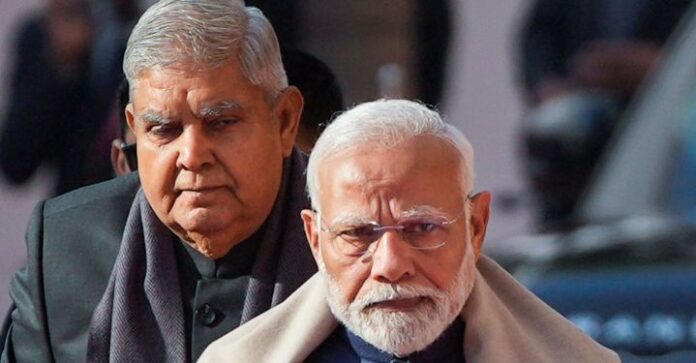In a development that caught both political observers and the public by surprise, Vice President Jagdeep Dhankhar resigned from his constitutional post on July 21, 2025, citing health reasons. The resignation, submitted to President Droupadi Murmu under Article 67(a) of the Indian Constitution, brings an abrupt end to his tenure that began in August 2022.
Dhankhar, who also served as the ex-officio Chairman of the Rajya Sabha, said in his resignation letter that he was stepping down “with a heavy heart” on the advice of medical professionals. The former Governor of West Bengal and seasoned political figure offered words of gratitude for his time in office and said it had been an “honour to serve the nation at such a high constitutional position.”
Modi’s Immediate Response: Praise and Respect
Prime Minister Narendra Modi was quick to acknowledge Dhankhar’s decision and legacy, issuing a warm public statement on social media platforms and through official channels. Modi said, “Jagdeep Dhankhar ji has had many opportunities to serve our country with distinction. His commitment to public service, legal acumen, and dedication to democracy have been commendable.”
Modi’s statement struck a tone of admiration and empathy, avoiding political overtones. He emphasized that Dhankhar’s service extended beyond just one office and reflected decades of contribution to public life. The Prime Minister also expressed hope for Dhankhar’s health and recovery.
A Resignation Rooted in Health Worries
While the Vice President did not detail the specific medical concerns, multiple reports over recent months suggest that Dhankhar had been facing significant health challenges. He had undergone cardiac treatment at AIIMS Delhi in early 2025 and was hospitalized briefly in June after collapsing at a public function in Dehradun.
Sources close to the Vice President’s office suggest that doctors advised a reduction in public engagement and official responsibilities. Given the rigorous schedule required of the Vice President, especially as Rajya Sabha Chairperson, his decision appears rooted in practical concerns about well-being.
A Legal Mind and Public Servant
Jagdeep Dhankhar, a senior advocate by training, entered politics in the late 1980s and rose through the ranks of the Janata Dal and later the BJP. He served as a Member of Parliament from Rajasthan and held ministerial roles in the 1990s. As Governor of West Bengal (2019–2022), he was known for frequent clashes with the state government, particularly over federal issues and education policy.
Upon his election as Vice President in August 2022, Dhankhar brought a fiery and sometimes confrontational style to the Rajya Sabha, where he presided over several key debates and navigated contentious sessions. His critics accused him of partisanship, while supporters praised his assertiveness in defending parliamentary procedure.
Opposition Caught Off Guard
The announcement of Dhankhar’s resignation took most opposition leaders by surprise. Congress General Secretary Jairam Ramesh tweeted that he had spoken to Dhankhar just hours earlier and found no hint of such a step. “This is an unexpected decision, and we hope it is truly due to health concerns. If so, we wish him strength and peace,” he wrote.
However, not all reactions were free from speculation. Some opposition leaders suggested that internal pressures or political repositioning within the BJP might have played a role in the timing of the resignation.
What’s Next? Constitutional and Political Implications
The Vice President of India is elected by members of both Houses of Parliament, and with this sudden vacancy, the Election Commission is expected to announce a by-election schedule soon. Constitutionally, a new Vice President must be elected within six months of the position becoming vacant.
In the interim, the Deputy Chairman of the Rajya Sabha will preside over the Upper House. Senior BJP leaders have already started informal consultations, with names such as Haribhau Bagade, a former Maharashtra Assembly Speaker, emerging in party circles.
Political observers believe the BJP may seek to nominate a candidate with a consensus-building image, especially with key legislative sessions on the horizon and opposition unity gaining momentum in recent weeks.
A Farewell Message to the Nation
Before formally stepping down, Dhankhar issued a public message expressing gratitude to the people of India and all members of Parliament. “Every opportunity I had in public life was a chance to serve this great nation. My deepest thanks to the President, Prime Minister, and all my parliamentary colleagues for their cooperation and trust.”
He specifically mentioned the “immense respect” he received during his tenure and expressed hope that India’s democratic institutions would continue to flourish.
Reflecting on a Polarizing But Impactful Tenure
While his tenure was not without controversy, Dhankhar leaves behind a legacy of active engagement. He advocated for stronger parliamentary accountability and was often vocal in debates about constitutional propriety. His defenders argue that he brought transparency and order to the Rajya Sabha; his detractors claim he blurred the line between neutrality and partisanship.
Either way, his departure marks the end of an assertive chapter in the history of India’s Vice Presidency. As the political landscape braces for new alignments and leadership changes, the nation watches with interest for the next occupant of the second-highest constitutional office.
Conclusion
Jagdeep Dhankhar’s resignation brings to a close a distinguished, if sometimes contentious, tenure marked by vigor and dedication. Prime Minister Modi’s praise underscores a shared national respect for public service, regardless of political divides. The months ahead will determine how this change influences parliamentary dynamics and the evolving narrative of India’s constitutional leadership.

